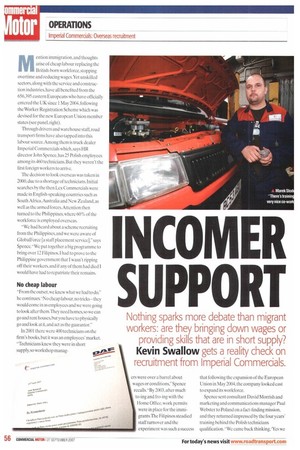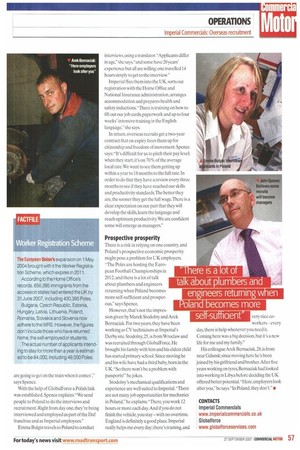RICOIVIER PPORT
Page 56

Page 57

If you've noticed an error in this article please click here to report it so we can fix it.
Nothing sparks more debate than migrant workers: are they bringing down wages or providing skills that are in short supply? Kevin Swallow gets a reality check on recruitment from Imperial Commercials.
Mention immigration, and thoughts arise of cheap labour replacing the British-born workforce, stopping overtime and reducing wages.Yet unskilled sectors,along with the service and construction industries, have all benefited from the 656,395 eastern Europeans who have officially entered the UK since I May 2004. following the Worker Registration Scheme which was devised for the new European Union member states (see panel, right).
Through drivers and warehouse staff, road transport firms have also tapped into this labour source. Among them is truck dealer Imperial Commercials which,says HR director John Spence, has 25 Polish employees among its 460 technicians. But they weren't the first foreign workers to arrive.
The decision to look overseas was taken in 2000, due Loa shortage of technicians. Initial searches by the then Lex Commercials were made in English-speaking countries such as South Africa,Australia and New Zealand, as well as the armed forces.Attention then turned to the Philippines, where 60% of the workforce is employed overseas.
-We had heard about a scheme recruiting from the Philippines,and we were aware of GlobalForce [a staff placement service]," says Spence. "We put together a big programme to bring over 12 Filipinos. I had to prove to the Philippine government that I wasn't ripping off their workers, and if any of them had died! would have had to repatriate their remains.
No cheap labour "From the outsetwe knew what we had to do," he cxmtinues."No cheap latxmtno tricks—they would come in as employees and we were going to look after them.They need homes, so we can go and rent houses, hut you have to physically go and look at it, and act as the guarantor."
In 2001 there were 400 technicians on the firm's books, but it was an employees' market. "Technicians knew they were in short supply, so workshop manag ers were over a barrel about wages or conditions,Spence recalls."By 2003, after much to-ing and fro-ing with the Home Office, work permits were in place for the immigrants.The Filipinos steadied staff turnover and the experiment was such a success that following the expansion of the European Union in May 2004, the company looked east to expand its workforce.
Spence sent consultant David Morrish and marketing and communications manager Paul Webster to Poland on a fact-finding mission, and they returned impressed by the four years' training behind the Polish technicians qualification."We came back thinking,`Yes we are going to get on the train when it comes'," says Spence.
With the help of GlobalForce a Polish link was established. Spence explains: "We send people to Poland to do the interviews and recruitment. Right from day one, they're being interviewed and employed as part of the Daf franchise and as Imperial employees."
Emma Bulgin travels to Poland to conduct interviews, using a translator. "Applicants differ in age," she says,"and some have 20 years' experience but all are willing; one travelled 14 hours simply to get to the interview."
Imperial flies them into the UK, sorts out registration with the Home Office and National Insurance administration, arranges accommodation and prepares health and safety inductions. "There is training on how to fill out our job cards, paperwork and up to four weeks' intensive training in the English language," she says.
In return, overseas recruits get a two-year contract that on expiry frees them up for citizenship and freedom of movement. Spence says: "It's difficult for us to pitch their pay level; when they start, it's on 70% of the average local rate. We want to see them getting up within a year to 18 months to the full rate. In order to do that they have a review every three months to see if they have reached our skills and productivity standards.The better they are, the sooner they get the full wage.There is a clear expectation on our part that they will develop the skills, learn the language and reach optimum productivity. We are confident some will emerge as managers."
Prospective prosperity There is a risk in relying on one country, and Poland's prospective economic prosperity might pose a problem for UK employers. -The Poles are hosting the European Football Championships in 2012, and there is a lot of talk about plumbers and engineers returning when Poland becomes more self-sufficient and prosperous," says Spence.
However, that's not the impression given by Marek Stodolny and Arek Bemaciak. For two years, they have been working as CV technicians at Imperial's Derby site. Stodolny, 25, is from Wroclaw and was recruited through GlobalForce. He brought his family with him and his eldest child has started primary school. Since moving he and his wife have had a third baby, born in the UK. "So there won't be a problem with passports!" he jokes.
Stodolny's mechanical qualifications and experience are well suited to Imperialf`There are not many job opportunities for mechanics in Poland," he explains."There, you work 12 hours or more each day.And if you do not finish the vehicle, you stay — with no overtime. England is definitely a good place. Imperial really helps me every day; there's training, and very nice coworkers—every day, there is help whenever you need it. Coming here was a big decision, but it's a new life for me and my family."
His colleague Arek Bernaciak, 28, is from near Gdansk;since moving here he's been joined by his girlfriend and brother. After five years working on tyres, Bemaciak had looked into working in Libya before deciding the UK offered better potential."Here,employers look after you," he says."In Poland, they don't."•


























































































































































































